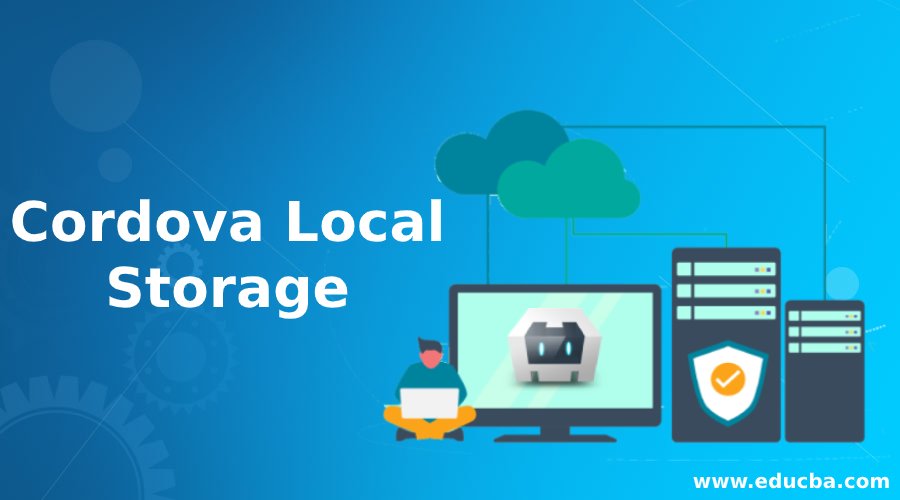Updated April 6, 2023

Introduction to Cordova Local Storage
During the creation of any app, a lot of data is created. For future use in the app, this data is required. We, therefore, need a certain storage area to safeguard this useful data. Cordova provides several data storage APIs. This is helpful for the user to use an app while the user is offline to increase the use of an app. These storage APIs can also enhance app performance. In this case, we define different storage APIs which include certain benefits and drawbacks. The basis for your specifications may be any API. We may also use a variety of different methods in one program for various purposes.
What is Local Storage?
Nearly all of the mobile devices would need to store data in local storage so data can be quickly retrieved from the specific location. Local storage is therefore ideal for storing useful information.
New options for local data storage were introduced by HTML5. We can use HTML5 in conjunction with various plugin mechanisms. It provides easy, synchronous pair storage for key/value. The WebView implementation supports Local Storage on all Cordova platforms. Plugin-Based Options are given as follows
- FileSystem AP: It is a W3C standard implemented from the Chrome browser while we’re talking about the FileSystem API. It API stores and recovers data from the local file system. The plugin File provides comprehensive implementation on every device in Córdoba.
- SQLite Plugin: The second version is the SQLite module with the API essentially the same as WebSQL. The following are the distinctions between these:
- it is available with Windows application support
- There is No Size limitations
- Cordova-SQLite-storage: It supports iOS & Windows systems for Android. Set the core version with the implementation of sqlite3.
- Cordova-SQLite-evfree: Just like the Cordova SQLite-ext with enhanced memory handling. The GPL v3 commercial license is available.
Advantages
Advantages of Local Storage which are as follows:
- The program is completely autonomous. No interaction with other users is possible so that all available data can be stored in local storage.
- By using local storage, we can also sync data online and offline, so a user can still use the program even though it is offline like Evernote.
- We can save unnecessary calls to a server by storing other data locally. Local storage can be defined as the basic storage option that can store user data in up to 5 MB in the browser. Local storage is generally known as inefficient because it gets a little bad cover. We can use local storage from browsers because it is relatively stable and secure and can be a viable storage alternative. However, with certain applications, this does not apply.
Disadvantages
Disadvantages of Local Storage which are as follows:
- Local storage can usually only be used when there is a lack of data. Sensitive data should not be stored because it is easily available or can be easily leaked.
- Local storage may be a convenient choice for a function like “Remember Me.” As nothing can happen if the data is lost, we just need to enter the password and username again.
Usage Summary
Local storage can be accessed via window.localStorage. The code below shows the key methods the returned storage object has exposed:
- var storage = window.localStorage; // Retrieve the interest with key name.
- var value = storage.getItem(key);
- storage.set Item(key, value) // For add or modify a key, define the key name and its value.storage.removeItem(key) // Transfer a key name to delete the access key
WebSQL
For the data store and query, we can use the Online SQL API using the SQL database. 50-200 MB of data can be stored. The exact limit is therefore determined by the network. When the storage limit has been exceeded, the WebView will allow the user to use more local space if appropriate. You should realize that the API does not support every platform, so you should use the WebSQl Cordova Plugin for use. If you want to use it, you can.
IndexedDB
The IndexedDB incorporates the power of the LocalStorageWebSQL APIs. It enables you to store arbitrary, key-indexed JavaScript objects. It provides also many advantages for a user of SQL tables without restricting their layout or having to describe it frontally. IndexedDB can be described as a simple data model such as LocalStorage. Instead of LocalStorage, we can build several repositories in which many stores are accessible accordingly. It provides better performance because of its search indexes and asynchronous API.
Recommended Articles
This is a guide to Cordova Local Storage. Here we also discuss the introduction and what is local storage? along with advantages and disadvantages. You may also have a look at the following articles to learn more –

